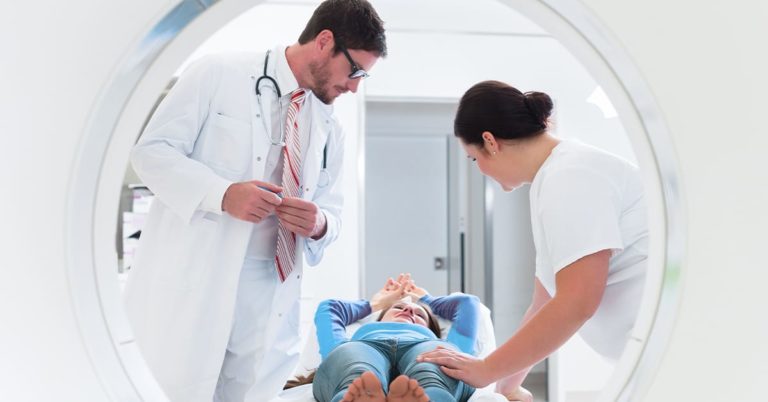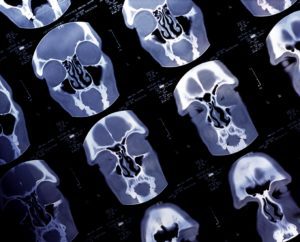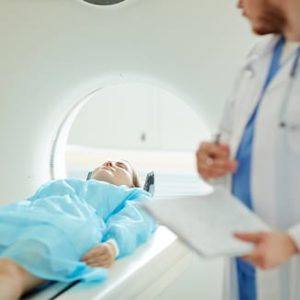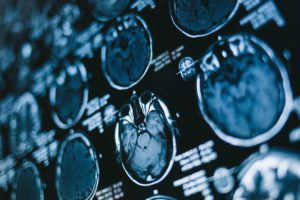A CT scan can allow radiologists to see:
• Abscesses
• Aneurysms
• Arteries and veins
• Blood clots
• Bones, including those of the skull
• Compression fractures
• Herniated discs
• Kidney stones
• Muscles and other soft tissues
• Neck masses
• Organs, including the heart, lungs, liver, kidneys and intestines
• Sinuses
• Spinal cord injuries
• Spinal stenosis
• Tumors, including those of the spine
Getting a CT scan takes only a short time and requires minimal preparation. On the day of your exam, be sure to wear loose-fitting clothing and leave metal objects, such as jewelry, at home, if possible—you’ll be asked to remove any metal objects you bring with you.
You may need to fast for a few hours before your exam if you’re undergoing a scan that requires a contrast dye. If your exam does require a contrast dye, you’ll receive it before the exam begins as either a flavorless drink or an injection. A contrast injection helps the radiologist see blood vessels, certain tissues and organs more clearly, while an oral contrast dye helps to produce clearer images of your stomach and bowels.
During the exam, you’ll lie still on a cushioned table that’ll move into the CT machine, a large cylinder that, from the front, resembles a giant doughnut. The machine will rotate around the table to capture image slices. A technologist will monitor the scan from a neighboring room, and you’ll be able to communicate with him or her at all times.
Scans typically take just minutes, and many last only seconds. Your entire exam, including the scan itself, will likely last no more than 30 minutes. Your physician will receive the scan results within 24 hours and share them with you.
If your doctor has ordered a CT scan, they’re likely looking for details that are impossible to spot with traditional X-rays. These details may include small injuries to bones, soft tissues, and blood vessels, any of which may help your doctor determine the underlying causes of your symptoms. Your CT scan may also help determine the best locations for biopsies, detect tumors, or investigate chronic diseases.
A key advantage of CT is its ability to display the details of bones, blood vessels, and soft tissues in the same image – something much harder to achieve with MRI and traditional X-rays. Given its ability to detect tumors, CT is also one of the most effective diagnostic imaging tools for cancer patients. Finally, it is commonly used to diagnose vascular diseases, osteoporosis, and traumatic injuries to internal organs.
In addition to its diagnostic imaging benefits, CT is also faster and cheaper than MRI. It also exposes patients to minimal radiation, less than a single traditional X-ray.
Unlike MRI, CT does not require your body to be immersed in an imaging machine. Instead, you’ll lie on a table that slides into a donut-shaped scanner, which will be positioned only around the area of your body being imaged. As you lie still, the scanner will rotate around you, allowing multiple X-ray devices to capture a three-dimensional image.
Depending upon the body part being imaged and the specific type of CT scan your doctor has ordered, your exam may require the use of a contrast dye. These dyes contain iodine, which illuminates certain tissues and helps radiologists see finer details in organs, bones, and blood vessels.
If your exam does require a contrast dye, it will be administered through an intravenous injection just before your exam, or as an oral solution several hours prior to your exam. These dyes are safe and well-tested. Our staff will examine your medical history to determine if there is any risk of allergic reaction.
The newest CT scanning machines can provide a full-body series of images in as little as 30 seconds. Including preparation time, your entire exam will likely take between 15 and 30 minutes.
Your preparation will depend on your exam type, medical history, and whether you will need a contrast dye. In all cases, AHI will provide you with full instructions prior to your exam, offering ample time to prepare.
Absolutely. CT does not require sedatives, and the process is quick and pain-free. Whether your exam requires a contrast dye or not, you’ll be able to drive home immediately.
The radiologist will review and interpret your CT scan as soon as it’s completed.* Within 24 hours to a few days, your doctor will receive a written report, as well as copies of the images for their own inspection.
CT scan costs vary widely, and the price of an exam may differ by hundreds of dollars between various hospitals and imaging centers. Typically, the cost is a combination of technical and professional fees. Technical fees include the costs of the imaging procedure itself, and professional fees are paid to the radiologists who analyze the results.
Another important factor is the specific type of CT scan being performed. Some types, such as brain scans, involve a more complex process and thorough analysis. Others, such as abdominal scans, are simpler to perform and assess.
Understanding your health insurance plan’s deductible is crucial. If you’ve met it, you may only need to pay 10-20% of the total bill. However, if you haven’t met your deductible or you’re uninsured, you’ll be responsible for the full amount.
For uninsured patients, there’s a potential for cost reduction. By negotiating self-pay discounts and considering paying your part in full at the time of service, you can take control of your healthcare costs.
Healthcare costs are rising, and when your doctor orders a CT scan, price will likely be one of your first concerns. Few physicians know their hospitals’ prices, however, and even when you call help lines, it can be tough to get a straight answer.
Fortunately, you can significantly reduce your out-of-pocket costs by shopping for an affordable imaging center. At American Health Imaging, we charge up to 60% less than hospitals and hospital-owned outpatient facilities for the same tests. We also work with most major insurers, and we provide competitive self-pay rates for uninsured patients.
If you’re concerned about the costs of your CT scan, MRI, or any other diagnostic imaging exam, you can rest assured that we provide the most affordable imaging at the highest quality in the market.











